-
Father's Day: What has Xi Jinping learned from his father?
2020-06-21 19:11:16 点此关注西非在线更多资讯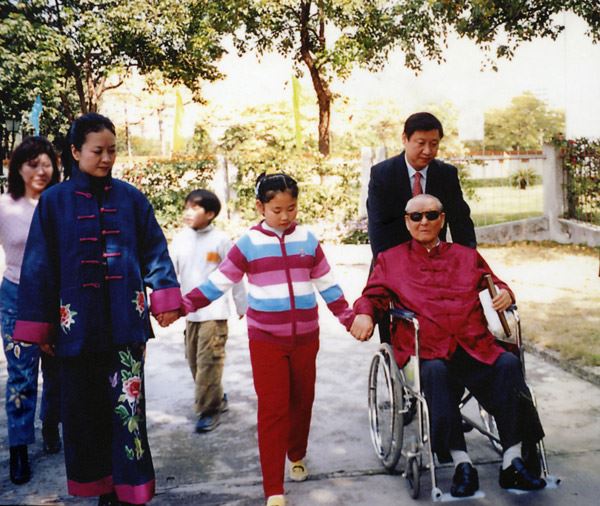
File photo of Xi Jinping (R, rear) with his father Xi Zhongxun (R, front), his wife Peng Liyuan (L, front) and his daughter (C, front). /Xinhua
"There are many noble characters I wish to inherit from my father," Xi Jinping, then governor of southeast China's Fujian Province, said in a letter of felicitation to his father Xi Zhongxun on his birthday in 2001.
Xi Zhongxun (1913-2002) was a leader of the Communist Party of China (CPC) and the state. Despite his heavy responsibilities, he enjoyed the opportunities of being with his kids at home.
The Xi's has a tradition of being strict with children and frugal, Xi Jinping's mother Qi Xin once said, attributing it to the influence of Xi Zhongxun.
Be diligent and pragmatic
When China began its reform and opening-up in 1978, Xi Zhongxun served as the Party chief of the southern province of Guangdong.
To get started in Guangdong, Xi Zhongxun worked around-the-clock. During one summer, he visited 23 counties in the scorching heat to familiarize himself with the local situation.
Inheriting his father's down-to-earth approach, Xi Jinping visited all the villages in Zhengding, Hebei Province during his tenure of county Party chief in the 1980s. Then in Ningde, Fujian, he visited nine counties within the first three months as secretary of the CPC Ningde Prefectural Committee, and traveled to most townships later on.
After he was transferred to east China's Zhejiang Province in 2002, he visited all 90 counties in over a year. During his brief tenure in Shanghai in 2007, he visited all its 19 districts and counties in seven months.
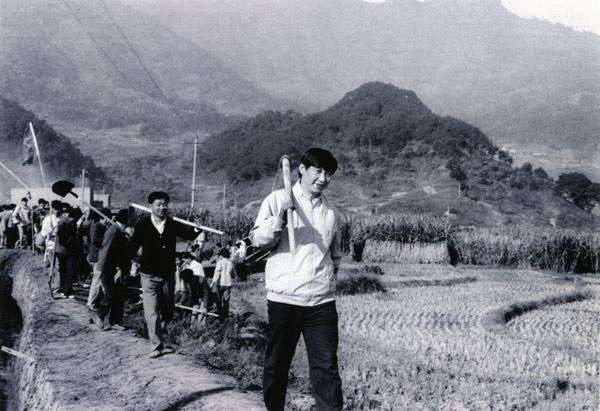
Xi Jinping (R), secretary of the Ningde Prefecture Committee of the Communist Party of China, participates in farm work in Ningde, southeast China's Fujian Province, 1989. /Xinhua
Take initiative in innovative reforms
Xi Zhongxun has also been assertive in pushing forward the opening-up process in the coastal province – an experimental unit of China's economic reform and opening to the outside world.
"We should dedicate ourselves to completing the structural reform of Guangdong as an experimental unit," Xi Zhongxun once said to officials. "We need to make up our mind that even if we could make mistakes, we are doing this," according to a book recounting the days when Xi Zhongxun governed Guangdong.
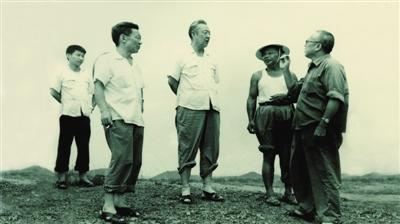
Xi Zhongxun (C) visits rural Huiyang, south China's Guangdong Province, August 1978. /CCTV
His risk-taking spirit in innovative reforms have deeply impacted Xi. Under Xi's leadership, China announced plans to establish the Xiongan New Area in north China's Hebei Province in 2017 to coordinate the development of the Beijing-Tianjin-Hebei (BTH) region – hailed as "a historic project" by Xi.
"We must remain patient, remembering that to achieve real success we must have an eye to the long-term future," Xi said at a symposium on the establishment of the Xiongan New Area.
Live a simple life
The mother once recalled how Xi and his younger brother used to wear clothes and shoes handed down from their elder sisters, including their old red cloth shoes.
At first, Xi Jinping found this embarrassing, according to his mother. But his father told his boy that they could dye the shoes to make them a better match for him.
This reflects a tradition in the Xi's to live a simple life, with Xi Jinping carrying on his family's tradition.
Read more:
Mother's Day: Memories of Xi Jinping growing up with his mother
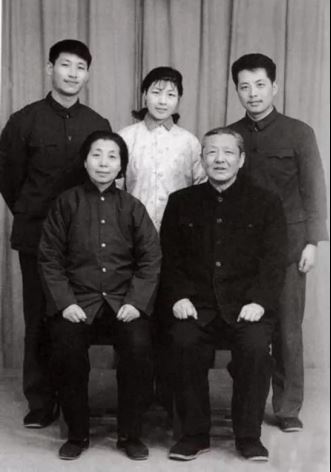
Xi Jinping's family photo in 1975. /CCTV
Xi has reiterated the importance of "being diligent and thrifty" and has stressed the idea that "honor to frugality and shame to extravagance" should be promoted.
Serve the people
Xi's father turned 88 in 2001. The number "88" is auspicious in Chinese culture, which made it an especially important birthday. At the time, Xi was governor of Fujian Province. He missed his father's birthday celebration due to busy schedule.
The apologetic son wrote a letter of gratitude to his father. Having read the letter, his father said to his other children and his friends at the birthday party: Work comes first and the state business takes priority. "Serving the people well is the best way of repaying me."
The father once told his son: "No matter what your job title is, serve the people diligently, consider the interests of the people with all your heart, maintain close ties with the people, and always stay approachable to the people."
Adhering to the path of "serving the people," Xi Jinping visited China's 14 contiguous areas of extreme poverty after becoming general secretary of the Communist Party of China (CPC) Central Committee in November 2012. He went to villages and households, and told communities that he is just "a servant of the people."
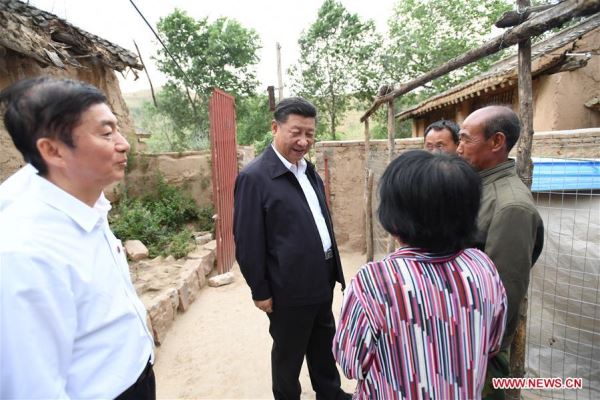
Xi Jinping (C) visits the poverty-stricken family of Cao Liuren (R1) in Zhaojiawa Village of Kelan County in Xinzhou City, north China's Shanxi Province, June 21, 2017. /Xinhua
Cherish family values
"It was an old of Bolshevik and Communist family tradition. This good family tradition should be passed down from generation to generation," Xi wrote in the letter to his father.
Since the 18th CPC National Congress in 2012, Xi Jinping has repeatedly recalled this family tradition.
"The family is the basic unit of society, and the first school that we attend in life. Regardless of how the times change, or how our lives are transformed, we must remain committed to making our families better, laying emphasis on life, learning, and conduct in the home."
- - Xi Jinping's speech at a gathering to celebrate the Spring Festival in 2015
Carrying on his family tradition, Xi Jinping has been committed to a people-centered philosophy of development and making every effort to meet the people's demand for a better life.